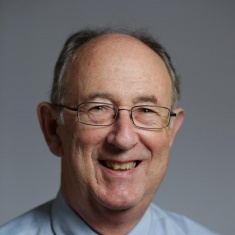
Over his long career, Kenneth Lyles, MD, professor of medicine (Geriatrics), has worked to find better treatments and prevention tips for older patients .
“My passion is old people with bone disease, and I love to do clinical trials," says Dr. Lyles.
Those passions have combined in a new research initiative studying the efficacy of Reclast™ (zoledronic acid) in a population of elderly patients with Parkinson’s disease, who are highly prone to fractures, such as broken hips. The trial is Trial of Parkinson’s and Zoledronic Acid (TOPAZ).
“In an earlier study, we used the FDA-approved osteoporosis drug zoledronic acid, and found that if you take it once a year, you reduce the fracture rate by 35%. That is important because after a fracture, particularly a hip fracture, there is a significantly elevated risk of subsequent fractures, and that involves an increased risk of mortality. Three years ago, my friend Dr. Steve Cummings from the University of California San Francisco called me and said he wanted to design a clinical trial where we recruit patients with Parkinson’s, give them either placebo or Reclast™ and hopefully change their fracture rates."
Now, working with Endocrinology, the trial is going forward.
“The trial is very simple. We want to recruit people over 65 who can walk (you can’t be bedridden) and who have Parkinson’s. We offer you a chance to get either calcium and a little bit of vitamin D, and that’s all, or we’ll come to your home and give you an intravenous infusion of either zoledronic acid or placebo. And then we’re going to watch your medical record to see if we cut your fracture rates.”
“We’re doing this all over the country, in all 48 contiguous states. Once you sign a consent form, we will mail you the calcium and vitamin D, and then a nurse appears at your home, checks your kidney function, and gives you the infusion in the comfort of your home. That’s one of the attractive things, because it reduces the burden on the patient and their family.”
The Parkinson’s Foundation is involved, helping recruit and maintaining a help desk with a neurologist always on call if there are Parkinson’s questions. Lyles is on call if patients have trouble taking the drug.
“The point is that if you have Parkinson’s disease, if you’re over 65, you have a 10-15% chance of having a fracture every year, because these people fall. You’re four times more likely to have a hip fracture than a normal older person the same age. And the fascinating thing that we still don’t fully understand is that this drug zoledronic acid reduces hip fractures by 40%, but it also cuts your risk of dying. In the big trial that I did previously, we cut the mortality rate by 28%.”
Since December 2019, the study has randomized 33 patients, with a plan to recruit a total of 3500 over the next two years.
“We believe that because one of the huge problems we know from studies of Parkinson’s patients is that when they have a fracture, they are much slower to spring back from it than a normal older person. And of course we know that hip fractures and other fractures are disastrous for older patients. That’s what I have made my career studying.”